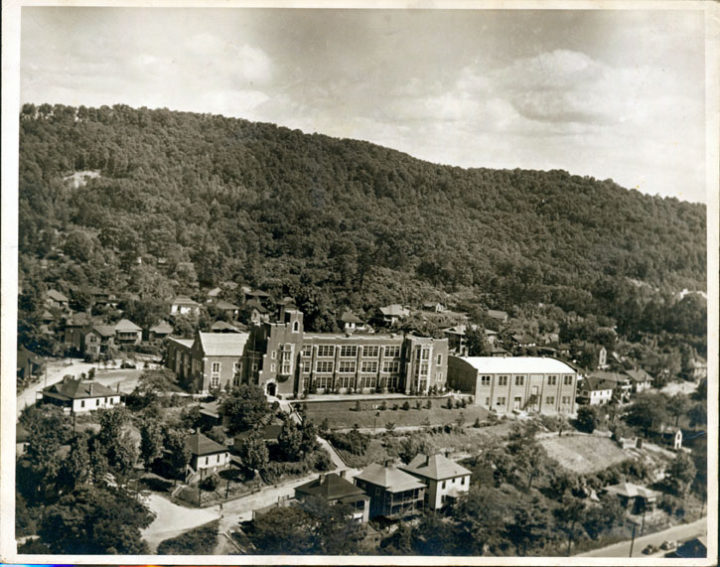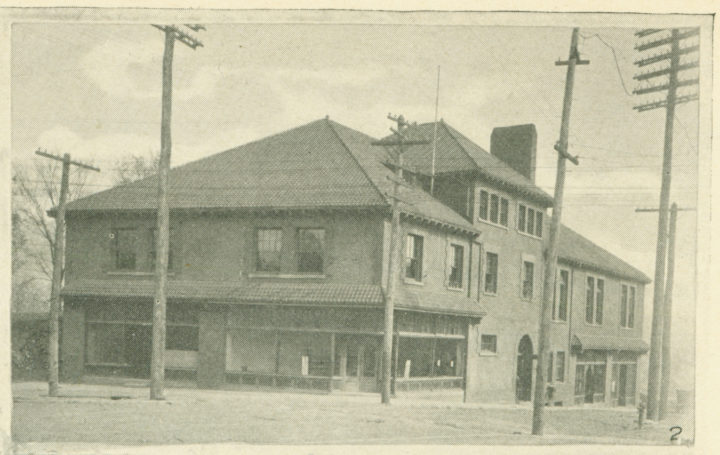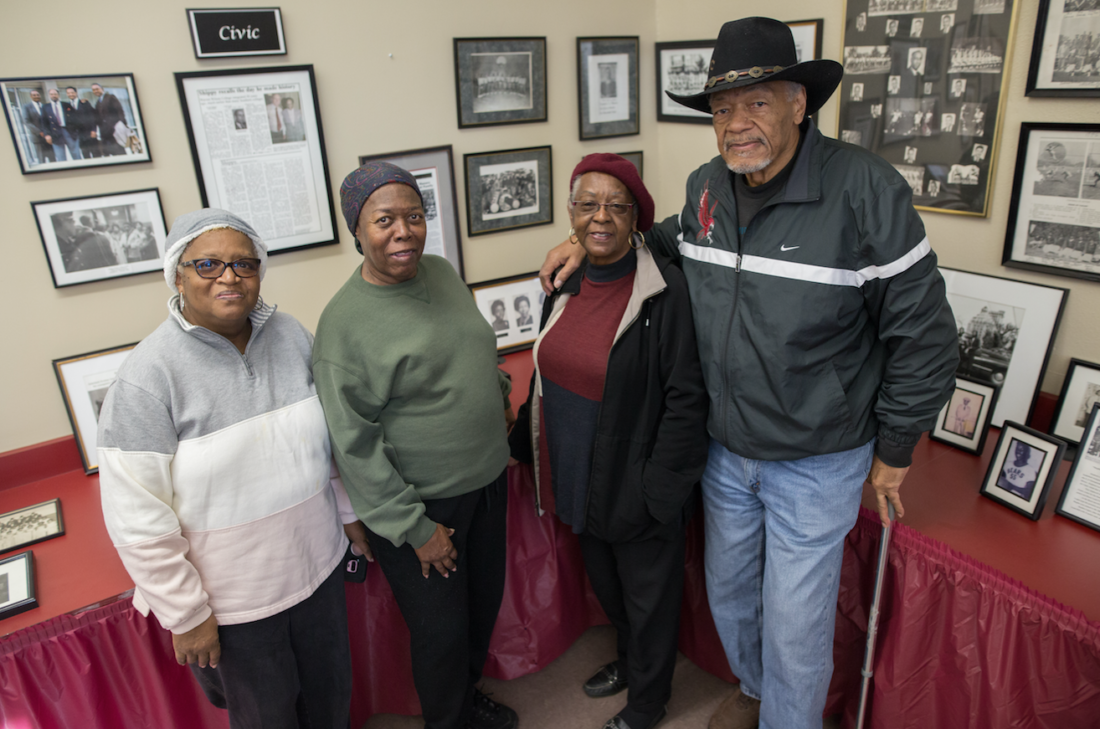“The cradle of black Asheville has been made invisible,” Sarah Judson wrote in her 2014 essay “I Am a Nasty Branch Kid: Women’s Memories of Place in the Era of Asheville’s Urban Renewal,” published by The North Carolina Historical Review.
In the piece, Judson, an associate professor of history and Africana studies at UNC Asheville, revisits the East End/Valley Street neighborhood, exploring what it was and what it became in the wake of federal, state and local government policies that promoted what was termed urban renewal. As the essay notes, between the late 1950s and mid-1980s countless homes, roads and businesses were wiped off the map, replaced by new highways, administration buildings and municipal garages.
Now, however, several complementary projects aim to take advantage of the surviving structures — including the YMI and Del Cardo buildings on Eagle Street and the gymnasium of the former all-black Stephens-Lee High School — to honor and elucidate this long-neglected history.
Beginning this year, various local nonprofits will leverage grants from the Buncombe County Tourism Development Authority to renovate and reconfigure all three structures. Meanwhile, through its Wayfinding Signs Program, the TDA will also fund interpretive kiosks and signage for the district.
“Anything we can do to spur a renaissance of African-American business culture and appreciation is going to benefit the entire community,” says Veronika Gunter, an independent community organizer and consultant to the Stephens-Lee project. Those benefits, she continues, will particularly help “our African-American residents who have been at best overlooked and at worst discriminated against and discouraged from participation.”
Dream team
Stephens-Lee High School opened in 1923, replacing the former Catholic Hill School, which was destroyed by a fire in 1917. As Darin Waters, associate professor of history at UNCA, noted in his 2012 dissertation, the school emerged as “the leading black public education center for all of Western North Carolina, a status that it retained until it was closed in 1965.”
A number of nonprofits subsequently occupied the site before the main building was razed in 1975. The Asheville City Board of Education ultimately sold the property (including the surviving gymnasium building) to the Asheville Parks and Recreation Department, which continues to operate it as a recreational center.

Since 2010, Catherine Mitchell, executive director of the nonprofit River Front Development Group, has been actively involved with the East End/Valley Street Neighborhood Association. Much of the dialogue has focused on future development plans for the district.
“One of the consistent themes that emerged … was the lack of African-American areas of remembrance,” says Mitchell. The neighborhood association’s top priority, she notes, “was turning the Stephens-Lee Recreation Center into a museum.”
Funded by a $100,000 TDA grant, the project has strong community support. Sasha Mitchell (no relation to Catherine), who chairs the city/county African American Heritage Commission, and Sarah Hart of the Stephens-Lee Alumni Association are among those holding leadership positions in the effort. In addition, many prominent members of Asheville’s African-American community serve on the group’s advisory board, including Waters and UNCA Professor Emeritus Dwight Mullen.
“They are a dream team,” says Catherine Mitchell.
Signs and stages
The initial phase of the two-stage plan for the district will include transforming the Stephens-Lee Alumni Room (located on the recreation center’s ground floor) into a museum-quality space and creating kiosks and exhibits in the adjacent hallway area. Although alumni have mounted displays in recent years, the grant funds will allow for professional presentation and storage while enabling association members to reclaim and display much of the school’s archival material, which is currently being kept at Appalachian State University and UNCA.
The Alumni Room will feature two interactive kiosks “loaded with the history of the community as well as maps showing redlining and pre-redlining, so you can tap on a space and find out what used to be there,” Gunter explains. “Because a lot of the streets have changed dramatically.”
Phase one will also involve installing historical markers and signage between the East End neighborhood and the River Arts District that will highlight African-American schools, churches and businesses. The signs, says Gunter, will be “very much rooted in the lived experiences of African-Americans in Asheville.”
Originally, both efforts were included in a single grant application. But financing the markers and signs through the Wayfinding Signs Program, a separate arm of the TDA, will both expedite the process and enable the tourism agency to coordinate and pay for long-term maintenance, notes Marla Tambellini. That will reduce the River Front Development Group’s overall costs, says Tambellini, who is deputy director of the Explore Asheville Convention and Visitors Bureau.
Work on both projects is expected to begin in October.
Phase two of the plan, which Gunter says isn’t funded yet, calls for creating a separate, free-standing museum on the Stephens-Lee High School site. The River Front Development Group is developing grant applications to support this more ambitious undertaking.
Upgrading the YMI
The nonprofit YMI Cultural Center sits less than a mile west of the Stephens-Lee Recreation Center. Completed in 1893 with financial assistance from George Washington Vanderbilt, the Young Men’s Institute offered housing and recreational opportunities for Biltmore Estate’s black workers. Later, as Judson notes in her 2014 article, “The YMI provided spaces for community meetings and social gatherings, housed a barbershop and other local businesses, and was home to the black branch of the Asheville public library.”

Yet another TDA grant ($800,000 to the Eagle Market Streets Development Corp.) will fund upgrades to the historic structure’s auditorium, conference room and gallery space. That work is expected to be completed this July.
According to the application, the YMI will partner with the grant recipient to bring arts and entertainment attractions to the district, including live theater, film screenings, musical and dance instruction and performances, as well as art exhibits.
The YMI will also promote itself to both local and out-of-town companies as a venue for conferences and meetings. Project coordinator Stephanie Swepson-Twitty notes that part of the development corporation’s mission is to support minority-owned businesses through such events. “We will be intentional in having conventions and meetings served by caterers … or other businesses of color,” she explains.
LEAF comes to the Del Cardo Building
Adjacent to the YMI stands the Del Cardo Building. Over the years, it’s been home to offices, shops and even a nightclub.
Once the renovations are completed (perhaps in August), the development corporation will move its headquarters to the top floor of the three-story structure. Another nonprofit, the Raleigh-based Carolina Small Business Development Fund, will also establish an office on that floor. Both organizations, says Swepson-Twitty, will work to encourage minority- and women-owned businesses in the neighborhood.
LEAF Global Arts Center, a local nonprofit that works to connect cultures through the arts, will lease the Del Cardo’s other floors, including the basement. Armed with its own $705,000 TDA grant, the organization plans to place its offices on the second floor while allocating the remaining space for assorted creative endeavors.

According to LEAF’s grant application, the ground floor will house a snack bar, four educational kiosks and an interactive world map. The Easel Rider Art Bar will accommodate guided and unguided art activities; there will also be an area dedicated to explaining the building’s history. A small stage along the rear of the space will enable it to serve as an evening performance venue.
Two split mezzanines will be sandwiched into the ground floor’s upper portion, providing areas for respite as well as space for the LEAF International ONEmic Studio. There, visitors will be able to learn about sound recording and record their own songs. The facility will also be available for rent outside of normal operating hours.
Meanwhile, the basement will feature three additional zones: the CAVE Mini-theater, LEAF International Immersion Room and Global Sound Underground.
A more inclusive tomorrow
“East End was a relatively self-sustaining black neighborhood,” writes Judson. “The neighborhood-based economy … was crucial for black survival and upward mobility.”
Swepson-Twitty hopes these planned projects will help trigger a similar trend of upward mobility within Asheville’s minority neighborhoods. Since joining the Eagle Market Streets Development Corp. in 2004, she says, “I’ve been impassioned with the desire to see individuals and people-of-color communities elevated through asset building and wealth creation.”
She believes the latest efforts by all of these entities represent a step in the right direction for Asheville.
“If we’re ever going to get back to an economic system that works in this country, it has to have as its tenet equity and inclusion,” she maintains. “The center of that has to be based on businesses that are solid and have strong participation from all the people — not just the 1 percent. … That’s what drives me to do this work: It’s making sure that all of the people have the ability to participate in the economy.”
Gunter agrees, while also stressing the crucial importance of preserving and honoring the history. By spotlighting the achievements and contributions made by prior generations of African-American residents, she believes, the city as a whole will be better equipped to shift its focus from how we got to where we are now to how we go about building a more equitable and inclusive tomorrow.




Before you comment
The comments section is here to provide a platform for civil dialogue on the issues we face together as a local community. Xpress is committed to offering this platform for all voices, but when the tone of the discussion gets nasty or strays off topic, we believe many people choose not to participate. Xpress editors are determined to moderate comments to ensure a constructive interchange is maintained. All comments judged not to be in keeping with the spirit of civil discourse will be removed and repeat violators will be banned. See here for our terms of service. Thank you for being part of this effort to promote respectful discussion.